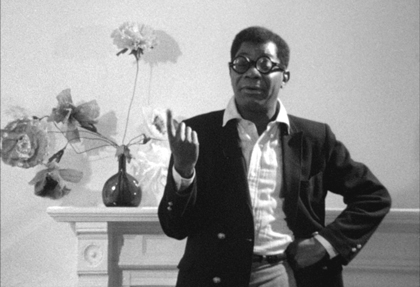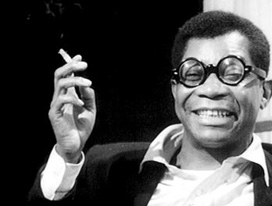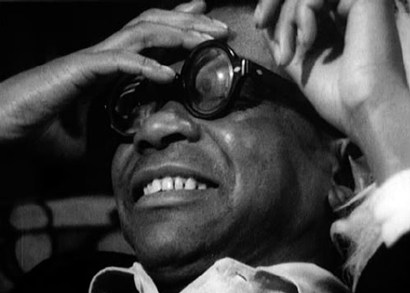
 |
|
|
|
Avant-garde filmmaker Shirley Clarke had the same problems as other New York independents, even though she was far more successful than most. Her films The Connection and The Cool World found art house distribution and brought her name to prominence, but three years passed before she was in a position to make another picture. She eventually funded her experimental docu feature Portrait of Jason with earnings from her work on a film for Expo '67. This project was to be a break from Clarke's earlier work, a documentary that confronted the limitations of objective filmmaking head on. Clarke enlisted a very special personality to be filmed for twelve hours straight. Jason Holiday (birth name Aaron Payne) was a self-described hustler, houseboy and aspiring cabaret performer. A gay black man at time when gay sex was illegal in most states, Jason had invented a hipster personality for himself and lived a dodgy life looking for the easy path and doing "whatever needed to be done to get by." 
We learn this and much more in Portrait of Jason, which consists of shots of Holiday talking about himself while drinking in Clarke's apartment in The Hotel Chelsea. Ms. Clarke lets us know the setup right from the beginning. There are no titles. When a camera film roll runs out, the screen goes black and we hear Clarke telling the sound man to keep rolling. Several seconds later a new magazine has been loaded and the picture resumes again. No attempt is made to hide the 'rough edges' of the film shoot, quite the opposite. One of the few editorial adjustments Clarke makes is to cut out flash frames as the camera stops and starts. Jason's self-invented public personality is "on" from the beginning, as he regales the audience with a barrage of smooth hipster jargon. Some of his talk is explicit about the sex and drugs in his life, but he also uses euphemisms and verbal sidesteps to steer away from places he doesn't want to go. For screenings in Sweden Clarke provided a glossary of Jason's hipster terminology, explaining expressions from 'uptight' and 'roach' to 'balling' and 'Sparkle Plenty.' We still must guess at what his full duties were when working as a "houseboy" to wealthy white women. Jason's audience for the shoot was just the three-man crew and a couple of observers. He talks as if holding court in a cabaret, taking pains to be entertaining and congenial. He spends a great deal of time embellishing his reputation, smiling and laughing at his own jokes, and assuring his audience that he's telling the truth. We're at all times aware that Shirley Clarke is present, as many takes begin with her verbal prompts. She'll say, "Tell us the cop story" and Jason will start a new monologue. Holiday apparently told the same stories at parties, as if they were material for a stand-up act. Clarke had known him as a colorful 'guy on the scene,' one of many eccentric personalities in search of fame. Clarke later said that Andy Warhol had tried to do something on film with Jason and Edie Sedgwick, but it hadn't worked out. As the session went on for twelve hours, Clarke's editorial task was mainly to extract and arrange the most interesting material. Jason drinks and smokes through the night, becoming more mellow as the hours click by. No fades or transitions are used between takes. Cameraman Jeri Sopanen begins and ends a number of shots with the camera purposely out of focus. Jason is a blur while gathering his thoughts, and then the focus racks to clarity as he gets rolling with a particular story. The cameraman adds the same kind of "focus punctuation" when Jason finishes a speech. After the figurative punch line, as Jason resumes his small talk, the focus is thrown out again to bring the 'scene' to a close. 
Clarke must have chosen Jason Holiday because she knew he'd deliver a spectacle. Most audiences in 1967 had never seen an openly gay man talk about his lifestyle in such an exhibitionist manner. Holiday is funny and charming in a definite black / gay lounge-lizard vein. He's also sufficiently intelligent to be judicious about what he thinks his audience can and cannot handle. At one point he relates an incident involving a thoughtless racist remark from one of his lady employers, and we realize that he must endure casual offenses like this on a daily basis. He pretend to have a thick skin, but we can also sense his vulnerability. Jason only hints that his employment can sometimes involve sexual services; even he doesn't feel comfortable being more specific. When he gets close to something too personally revealing, he switches into Funny Mode and entertains us with another anecdote. At one point Holiday demonstrates an unexplainable 'cool' bit of body language, snapping his fingers while swinging his hand over his head in an offhand manner. The gesture expresses his laid-back attitude in a way that words cannot. Portrait of Jason is far more than a film piece about an odd personality. A great deal of critical ink has been expended on its challenge to the notion of filmic objectivity. Shirley Clarke has eliminated most of the directorial tools used by documentary filmmakers to impose an author's message on their material. There are no passages of narration and no explanatory titles. The editing is a series of simple choices to either use or not use footage; there is no montage cutting and little if any tightening of speeches. Edgar Morin and Jean Rouch used their entire 1960 film Chronicle of a Summer to ponder the practicality of cinéma vérité. Can film subjects really 'be themselves', or does the presence of a camera inevitably alter their behavior? Shirley Clarke's movie suggests an added complication, that the idea of "being ourselves" may be meaningless. We put on faces for the public, act differently with our family than with our co-workers, etc.. Jason has invented a complex public personality to survive in his unusual circumstance of being black as well as gay in a white-dominated society. Is there a "real" Jason Holiday / Aaron Payne? Is he acting or behaving? Clarke knows that asking Holiday to be himself is meaningless, because Holiday's normal state is a deliberate performance. He carefully edits his checkered past in his monologues, and continually refers to his dream of being a New York stage performer -- he's even brought along a bag of hats bought for his act, which he tries on. Jason often affects speech patterns that remind us of characters from Tennessee Williams. Viewers unfamiliar with New York artistic fringe dwellers might conclude that he's seriously unbalanced, when he's merely adapted himself to an out-of-balance situation. Jason probably sees himself as a male, black, gay Holly Golightly. 
Despite Clarke's occasional prompts from behind the camera, Jason Holiday is not really being directed. His personality would resist any attempt to shape him into a cinema pigeonhole; he's directing himself. We aren't certain what's happening in the film's later chapters, when Jason becomes more morose and self-critical, eventually appearing to drop his guard and admitting that he's lonely and unhappy. That's when we hear another off-camera voice, actor Carl Lee. Lee verbally badgers Holiday, pointing out his evasions and prevarications, urging him to stop the BS and be more honest. Jason breaks down and cries. We cannot be certain it the tears are spontaneous, or if the clever fellow is providing a dramatic finish to his filmic portrait. Is Jason exercising that much control over his 'performance', or has the long shooting session really broken down some of his defenses? We're told that Shirley Clarke omitted more material in which she carried on the attack, reminding Jason of some inexcusable behavior and pressing him to face up to it. She later explained that the "scene" wasn't necessary, that it didn't break new emotional ground. Milestone Films distributes video but is also a major distributor of important independent cinema. For several years the company has been working on "Project Shirley", an effort to find, restore and reissue the work of Shirley Clarke. All that remained of Portrait of Jason were some battered prints and edited versions. The Wisconsin Center for Film and Theater Research had some film cans labeled as outtakes, and Milestone's Dennis Doros had them sent to the UCLA Film Archive. As the footage had no titles and was interrupted by pieces of black leader, it was first assumed that they were indeed outtakes, until UCLA's Ross Lipman doubled back to check. The reels were then confirmed as a16mm fine-grain of the entire uncut feature. Milestone's theatrical restoration of Portrait of Jason brings the show to a clarity not seen since a few legendary New York screenings back in 1967. The restoration of Portrait of Jason played in New York at the IFC Center, and opens May 17 in Los Angeles at the New Beverly Cinema.
Reviews on the Savant main site have additional credits information and are often updated and annotated with footnotes, reader input and graphics.
Review Staff | About DVD Talk | Newsletter Subscribe | Join DVD Talk Forum |
| ||||||||||||||||||